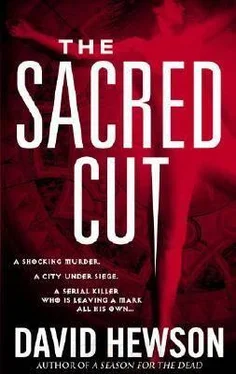“Maybe.” Falcone knew this area well. The houses were identical: terraced properties that fetched a fortune in spite of the constant roar of traffic from Spagna to Popolo. They were apartments now, all with a single shared door at the front. There was just one way out. At this time of day it was easy, too, to gain entrance to any place like this in the city.
The car pulled over. Falcone got out, walked to the intercom, pressed a couple of buttons simultaneously and waited for the electronic lock to buzz. When it did, he held open the green wooden door and let his team of six walk into the narrow communal passage.
Leapman couldn’t believe his eyes.
“It’s what we do to let the trash man in,” Falcone explained, nodding at the pile of black plastic bags behind the front door.
“Jesus,” Leapman groaned. He pulled out a black revolver, checked it, then, under Falcone’s fierce gaze, slid the weapon back in its leather shoulder holster.
“No guns,” Falcone ordered. “Not unless I say so.”
One of the detectives was grilling a woman who’d come out of the first ground-floor apartment.
“Third floor, Number Nine,” he said. “Foreigner, rented apartment. Been here two weeks or so. She hasn’t seen him since the night before last. She’s got a key.”
Falcone sent the entry team ahead. Leapman stayed with him downstairs. The American seemed bored. Falcone took a look at his own pistol, just in case, then quickly put it away.
“You ever used that?” Leapman asked.
“Lots of times,” Falcone answered. “Just never had to fire it, that’s all.”
Leapman was laughing again. “This is the European thing, isn’t it?” he asked.
“You’ve lost me.”
“The idea that there’s some kind of middle way we could take if only we were civilized enough to see it. The idea you can just walk down the centre of the road and then everything will be just fine, all the crap will never come and touch you.”
“Perhaps it’s best not to judge situations too quickly. I don’t believe that’s a European thing or any other kind of thing either. It’s just how some of us work.”
Leapman grimaced. “Until you wise up. That’s what separates us. See, we don’t wait for the nasty surprises to prove what we know already. This guy’s a lunatic, right? You treat him like one or you get hurt.”
“Possibly.” Falcone wondered how many men Leapman had in Rome, where they were, what they were doing. “I thought you might have asked Agent Deacon along,” he said. “Or someone.”
“Why? Is she supposed to give an art lesson here, too?”
“She got us this far. With my men, of course.”
Peroni had called in at one a.m. with a brief report after the incident in the Campo. It had been shared with Leapman, at Moretti’s insistence. Falcone had then called Viale, partly because he liked the idea of getting him out of bed. The SISDE man had listened, grunted, then put down the phone.
“She did,” Leapman murmured sourly. “She saw the guy too and look what happened. He walks. She blacks out. It’s a crying shame. That kid just can’t cut it.”
Falcon didn’t argue. Emily Deacon looked all wrong in the job Leapman had given her, though Leo had no intention of saying so. “In that case, why did you bring her here?”
Leapman resented the question. Falcone would have felt the same way in his position. These were operational decisions. You left them to the officer in charge, until they went wrong.
“It seemed a good idea at the time,” the American said after a while. “She speaks Italian like one of you. She knows this place. And like I said yesterday, she’s got one hell of an incentive to see this guy go down. Is that good enough? Can we get on with taking a look around now?”
Falcone went up the stone steps and walked into the room, where his team were making a slow and professional job of checking out what was there. It was a typical short-term rented place: a large studio with an old sofa, a tiny table with grubby chairs, a small, cheap colour TV. There was an uncomfortable-looking single bed in the corner, unmade, with the sheets strewn on the floor. Falcone walked into the cramped bathroom. At first glance there was nothing there he could work with for DNA: no toothbrush, no used tissues. The main room looked just as bare.
“The guy came back and cleared everything,” Leapman said. “Smart. He was probably in and out of here before you people finished dealing with the medics.”
But medics were important, Falcone thought. You had to work out your priorities.
“How’d this kid know he was from here?” Leapman wondered. “Was she working a trick for him or something?”
“No.” They’d got some background on the girl already. One of the charities had worked with her for a few months with little success. It was a psychological problem, one that wouldn’t go away. A form of kleptomania, constant, even when she knew she’d be caught. “She follows people she thinks are interesting. Then she steals something from them. He just came out of this place and she saw him in the street, followed him to the Pantheon. She remembered a green door and the Gucci shop.”
Leapman looked interested. “The kid saw him meet up with the woman?”
“No. She lost him for a little while. The couple were already inside the Pantheon when she went in. Which is interesting in itself. Perhaps they already knew each other.”
“That’s ridiculous,” Leapman stated. “I’d like to hear it from the street brat myself.”
“No,” Falcone said firmly. “You can have the transcript of the interview but I’m not putting a child up for interrogation. We wouldn’t allow that with one of our own. It’s against the law. I’m sorry.”
The FBI agent sighed, but at least he didn’t seem ready to argue. “The law. I won’t go to the wall over this one, Falcone. But don’t you try standing in my way when it comes to something important. I won’t tolerate it.”
“I imagine not.” Falcone sighed, “What do you want of me, Agent Leapman?”
“Some action might be nice.”
“Action?” That was, it seemed to Falcone, the last thing they needed. The killer moved carefully, thought ahead. He wasn’t going to be caught by some random, blanket operation. He’d disappear the moment he heard anyone coming down the street.
“We have almost fifty officers working on this case already. I think that counts as action.”
Leapman picked up a sweater one of the detectives had found in a cupboard. It was the only item the man hadn’t taken. Maybe it didn’t even belong to him. Leapman didn’t look as if he cared. Falcone had to remind himself about the kind of officer he was dealing with here. Leapman wasn’t a cop. He was part of a rigid, bureaucratic apparatus that worked by the book. He was accustomed to thinking that “action”-constant investigation, the sledgehammer of detection that vast amounts of manpower allowed-brought results. It was one way of looking at things, Falcone thought, it made sense. But not always. You had to be flexible. You had to think round problems. You couldn’t just follow a set of procedures laid out on the page of some textbook.
The American’s cell phone trilled. He walked over to the corner so that no one could hear. Falcone turned to Ciccone, one of the team he’d brought along, and asked, “Whose apartment is this? Who’d he rent from?”
It was, as Falcone hoped, the woman who had given them the keys.
Leapman finished the call and announced, “I’m gone. I want an update when you hear something, Falcone.”
“I’ll do my very best,” the inspector replied, smiling. “Let me see you out.”
They walked back downstairs. Falcone held open the door. There was a flurry of snow outside. Maybe it was that which made Leapman hesitate. He gave Falcone a sharp glance.
Читать дальше










